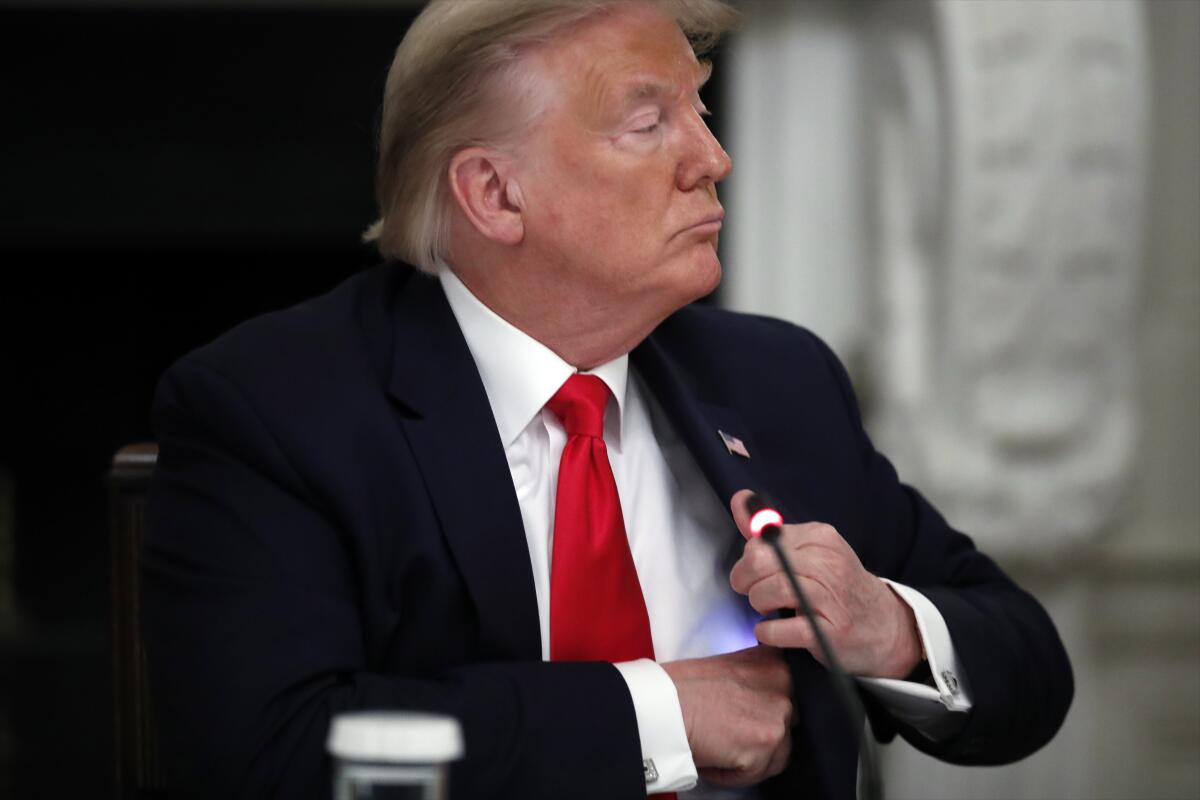Facebook removes Trump campaign ads featuring symbol used by Nazis

- Share via
Facebook removed a series of ads from the Trump campaign on Thursday for prominently featuring an upside-down red triangle in its posts about antifascist activists, a symbol once applied by Nazi Germany to political prisoners.
“We removed these posts and ads for violating our policy against organized hate,” Facebook said in a statement. “Our policy prohibits using a banned hate group’s symbol to identify political prisoners without the context that condemns or discusses the symbol.”
The ads, first reported by the Washington Post, declared that “Dangerous MOBS of far-left groups are running through our streets and causing absolute mayhem” and “are DESTROYING our cities and rioting.”
The posts also asked the president’s supporters to demand that “ANTIFA” be designated a terrorist organization, though “antifa” does not comprise formal organizations and instead is an umbrella term for leftists who actively oppose far-right figures and groups such as neo-Nazis and white nationalists.
“Whether aware of the history or meaning, for the Trump campaign to use a symbol — one which is practically identical to that used by the Nazi regime to classify political prisoners in concentration camps — to attack his opponents is offensive and deeply troubling,” Jonathan Greenblatt, chief executive of the Anti-Defamation League, the anti-extremist organization, said in a statement.
“It is not difficult for one to criticize their political opponent without using Nazi-era imagery,” Greenblatt said. “We implore the Trump campaign to take greater caution and familiarize themselves with the historical context before doing so. Ignorance is not an excuse for appropriating hateful symbols.”
A Trump campaign spokesman did not respond to a request for comment, but on Twitter, the campaign’s rapid response team tweeted that the red triangle is “widely used by Antifa. It was used in an ad about Antifa. It is not in the ADL’s Hate Symbols Database.”
Though some antifascist activists have used the red triangle symbol before, “it is not a particularly common antifa symbol,” Anti-Defamation League spokesman Jake Hyman wrote in an email.
“Their use is similar to the use of the pink triangle by some LGBTQ+ groups,” Hyman said. “Usage of a concentration camp symbol by the heirs of persecuted categories, such as antifascists and those in the LGBTQ+ community, is however very different from someone using a Nazi concentration camp image to label one’s enemies.”
The ADL spokesman added: “As for the Trump team defense about the particular symbol not being in our database, it should be noted that the database is not a database of historical Nazi symbols; it is a database of symbols commonly used by modern extremists and white supremacists in the United States.”
Trump has blamed antifascist activists for the violence that erupted during some of the recent protests after the death of George Floyd in Minneapolis, but federal law enforcement officials have offered little evidence of this. In California and Nevada, there have been arrests of people linked to far-right fringe groups believed to be aiming to capitalize on protests.
The Trump campaign has previously been criticized for sharing content linked to right-wing extremists or featuring anti-Semitic imagery.
In November 2015, Trump retweeted an image with fake African American crime statistics that first appeared on a neo-Nazi Twitter account. In January 2016, he retweeted a user named @WhiteGenocideTM. He thanked an apparent white nationalist for support in February 2016 and retweeted another apparent white nationalist in April 2016 who was praising him for his policies. In July 2016, Trump tweeted a photo of Hillary Clinton next to a Star of David, which Trump claimed was a sheriff’s badge.
The Associated Press contributed to this report.
Among the big social media platforms, Twitter has taken a unique approach to moderating user speech, one that’s both unusually subjective and notably principled. That approach has allowed the company to avoid direct conflict with President Trump — until this week.
More to Read
Get the L.A. Times Politics newsletter
Deeply reported insights into legislation, politics and policy from Sacramento, Washington and beyond. In your inbox three times per week.
You may occasionally receive promotional content from the Los Angeles Times.











